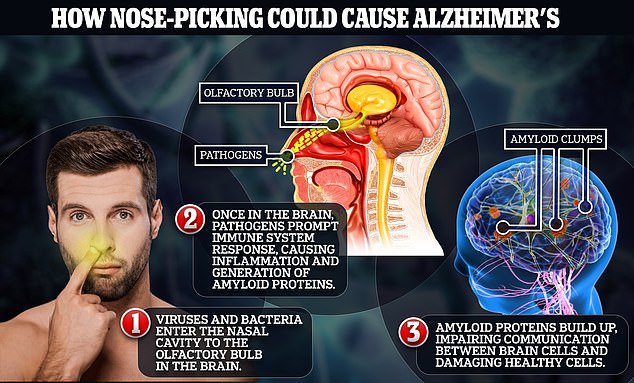- Do you have a health story? Contact us: health@dailymail.com
Nose picking is unsightly, but it can also increase your risk of dementia.
Scientists have called for more research into the link between this bad habit and Alzheimer’s disease.
Last month, in an article published in a medical journal, they admitted that studies on the topic were “sparse.”
But research suggests nose picking is “a significant risk factor,” they added.
The theory is that germs are transferred from the fingers to the nose, from where they travel to the brain and cause inflammation.
This memory-destroying disease is characterized by the buildup of harmful protein deposits in the brain, known as amyloid proteins. When the brain becomes inflamed, it expresses an amyloid precursor protein that can build up into clumps and affect healthy brain cells.
Over time, this inflammation damages brain cells and causes the symptoms associated with dementia.
Nose picking can also damage the lining of the nasal wall, making it easier for microorganisms to enter the bloodstream and trigger infection and cause inflammation.
Calls for further investigations were made in a letter published in the American Journal of Medical Sciences.
They cited 10 studies showing a possible association, including one supported by the National Institutes of Health (NIH) from last year that also warned about the possible link.
In the letter, they said: ‘Several pathogens, including those that invade the brain through the nasal epithelium… have been linked to Alzheimer’s disease and have been isolated during post-mortem analysis.
‘In conclusion, these studies show that nose picking is a significant risk factor and has a role in the progression of Alzheimer’s disease.
‘We propose further research to understand the association between nose picking and Alzheimer’s disease in the form of case-control studies with larger population samples.’
Pathogens thought to cause amyloid plaques include the herpes virus, coronavirus, the bacteria behind pneumonia, and the fungus Candida albicans.

Studies suggest that nearly all Americans pick their nose, with many doing so four times a day on average.
These can travel along the olfactory nerve, which connects the nose and brain, to the olfactory bulb, a small area at the bottom of the brain linked to smell, and cause an infection.
The letter was written by scientists from the Pakistan Institute of Medical Sciences and Qatar’s Hamad Medical Corporation.
This follows research by other scientists, including a team from Australia, who also warned of a link between nose picking and Alzheimer’s.
They called for simple intervention measures, such as regular handwashing, to reduce the risk posed by nose picking, calling this an “easy prevention measure” for the disease.
“One of the lessons learned from Covid is the value of hand hygiene through frequent handwashing and use of hand sanitizers,” they wrote.
‘We suggest that these routine hygiene procedures be made mandatory routine procedures for incurable nose picking.’
Alzheimer’s disease is the most common form of dementia worldwide, affecting approximately 6.7 million Americans aged 65 and older.
The exact origins of the disease are still being studied, but scientists have pointed to a buildup of amyloid plaques and tangles in the brain made from a protein called tau.
Other suggestions include that it could be linked to damage and scarring to blood vessels within the brain, which could reduce blood flow and trigger small, unnoticed strokes that can cause the disease.
Surveys suggest that nearly all Americans pick their nose daily, removing dried mucus from the cavity four times a day on average.

